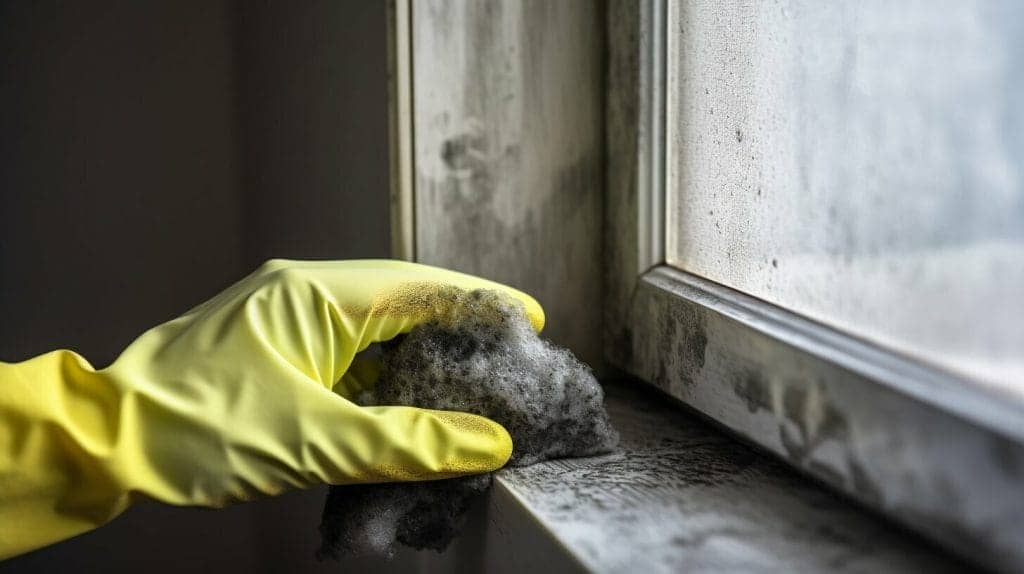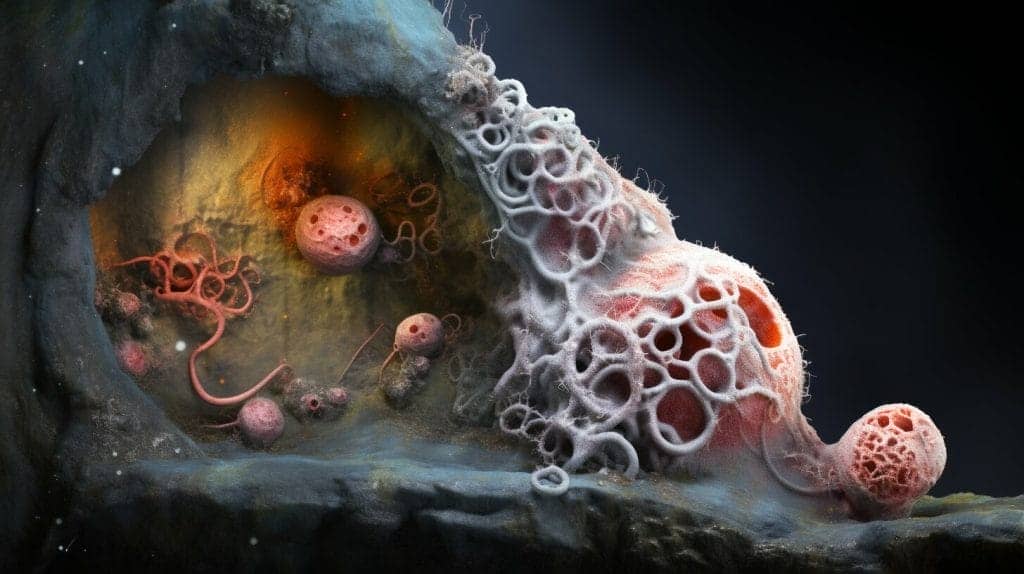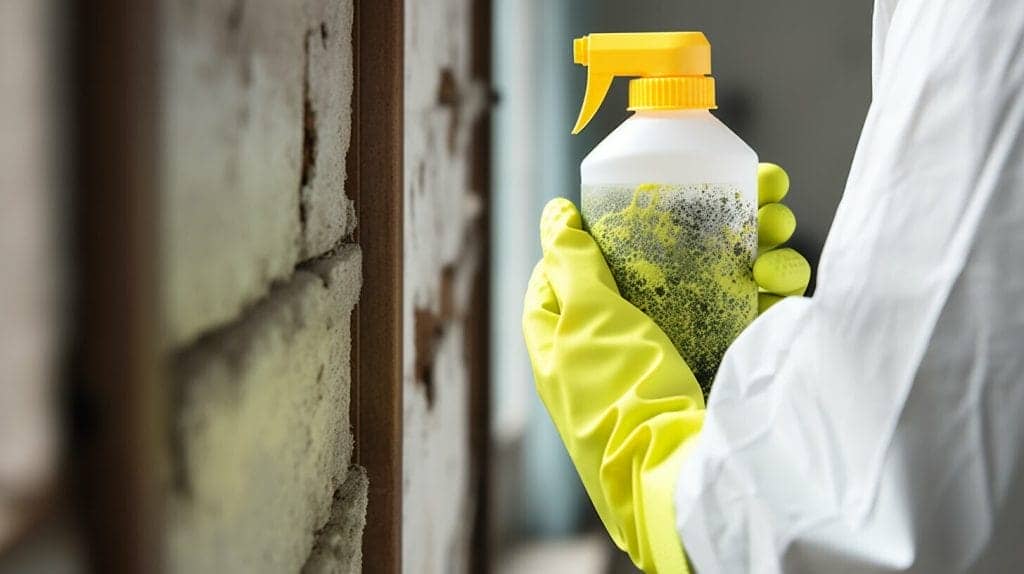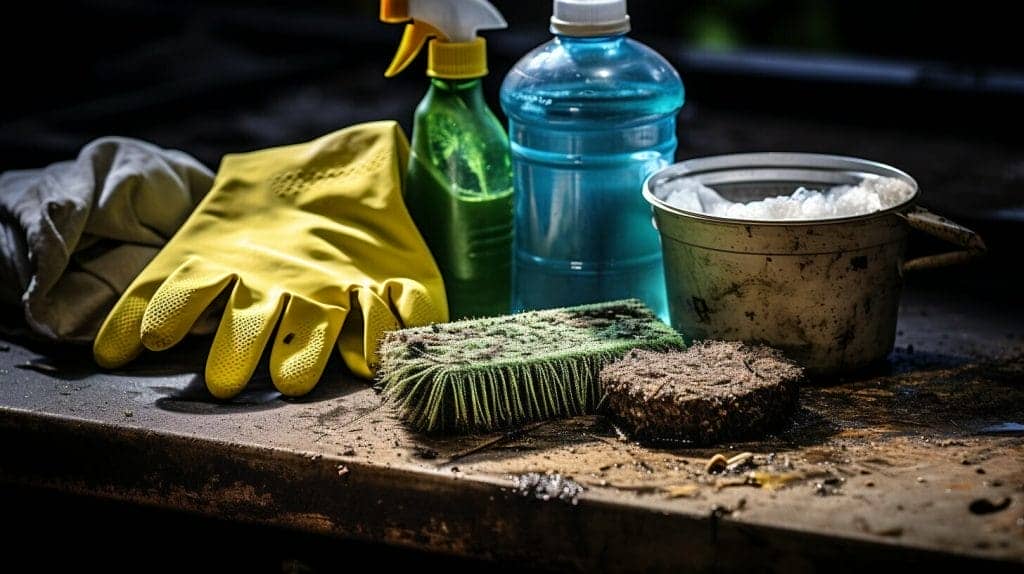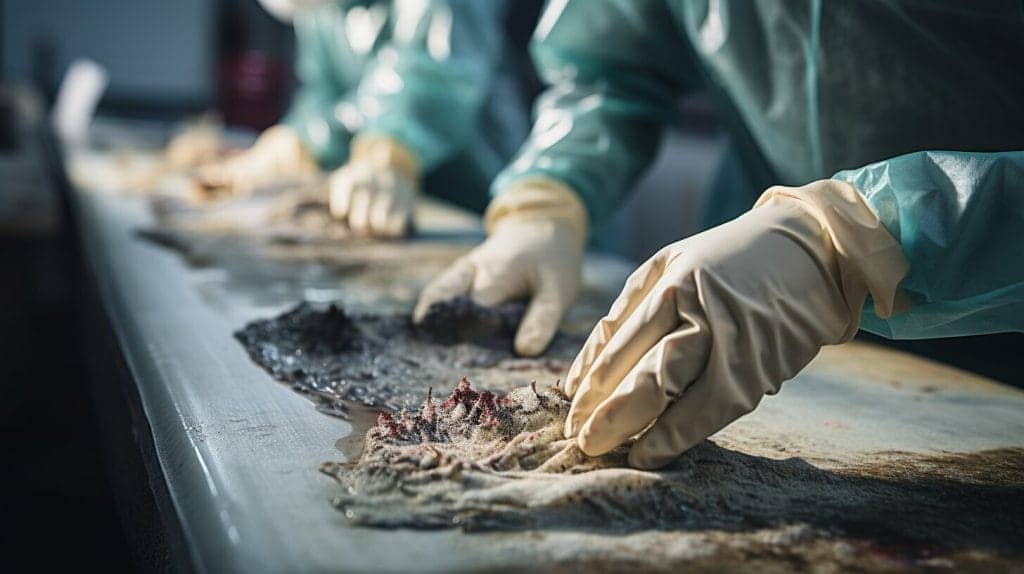Mold is a common problem in many homes and buildings, and it can have serious health effects for individuals who are exposed to it. Mold can cause respiratory issues, allergic reactions, and other health problems that can impact your quality of life.
That’s why it’s essential to seek help from centers for mold health issues. These centers specialize in diagnosing, treating, and preventing mold-related health issues and can provide you with the guidance you need to live a healthier life.
In this article, we’ll take a closer look at mold-related health issues and how centers for mold health issues can help you overcome them. We’ll cover everything from the harmful effects of mold exposure on health to the various services offered at mold health centers.
Key Takeaways:
- Mold exposure can cause respiratory issues, allergic reactions, and other health problems.
- Centers for mold health issues specialize in diagnosing, treating, and preventing mold-related health issues.
- Mold health centers offer a range of services, including diagnostic testing, treatment options, counseling, and support services.
Understanding the Impact of Mold Exposure on Health
Mold exposure can have severe consequences on a person’s health. Individuals who are exposed to mold frequently may experience a range of symptoms and illnesses, making it crucial to understand the impact of this fungus on their health.
Mold exposure can lead to respiratory issues, including coughing, wheezing, and asthma. It can also cause skin irritation, eye irritation, and headaches. Mold can even affect the immune system, causing a range of illnesses, including infections and allergic reactions. Those with pre-existing conditions or weakened immune systems may be particularly vulnerable to mold exposure.
Understanding the Causes of Mold Exposure
Mold can grow in areas with excess moisture, such as kitchens, bathrooms, and basements. It can also grow in areas affected by flooding or water damage. It can thrive in warm and humid environments, making it common in many regions of the United States.
Individuals who live in homes or work in buildings with mold growth may be at risk of mold exposure. It is essential to identify and address the root cause of mold growth to prevent future exposure.
Seeking Specialized Care for Mold-Related Health Issues
Individuals experiencing symptoms related to mold exposure should seek specialized care from mold-related health centers or mold illness centers. These centers have mold health specialists who can diagnose and treat a range of mold-related illnesses and symptoms.
It is crucial to seek specialized care from experts who understand the intricacies of mold-related health issues to ensure accurate diagnosis and proper treatment.
The Holistic Approach at Oasis Medical Institute in Tijuana, MX
Oasis Medical Institute in Tijuana, MX, is a renowned center for treating mold-related health concerns. The center’s holistic approach integrates the best of conventional medicine with alternative therapies for Mold Toxicity under the guidance of Dr. Francisco Contreras, MD.
Their holistic Mold Toxicity treatment program is tailored to individual needs, making it possible for patients to access comprehensive care in one location. The center uses a multidisciplinary approach, which includes nutrition therapy, detoxification, and lifestyle changes.
| Treatment Options: | Description: |
|---|---|
| IV Nutrient Therapy | This helps to deliver vitamins, minerals, and other essential nutrients to the body intravenously, which can be useful in restoring the body’s balance. |
| Oxygen Therapy | Oxygen therapy helps to increase the amount of oxygen in the body, which can be useful in healing and detoxifying the affected areas. |
| Acupuncture | This helps to restore the body’s balance and promote healing. It is useful in treating a variety of symptoms, including pain, fatigue, and digestive issues. |
| Counseling and Education | Oasis Medical Institute provides counseling, and education to help patients understand mold-related health concerns and how to manage them effectively. |
At Oasis Medical Institute, patients are assured of getting personalized attention from a team of experts in a comfortable and serene environment. The center’s focus on a holistic approach is crucial in achieving positive outcomes in the treatment of mold-related health concerns.
Choosing the Right Mold Health Center for Your Needs
When it comes to seeking specialized care for mold-related health issues, it is crucial to choose the right mold health center that meets your specific needs. With so many options available, it can be overwhelming to make a decision. However, there are several factors to consider that can help you make an informed choice.
First, expertise and experience are critical when selecting a mold health center. Look for centers that have experienced mold health specialists who have the knowledge and training to effectively diagnose and treat mold-related health problems. Also, consider the center’s reputation and the number of successful cases they have handled in the past.
Second, treatment approaches offered by different centers can vary widely. Some centers may emphasize medication-based treatments, while others may offer a more holistic approach that integrates various therapies and treatments. It is essential to research the treatment options offered by different centers and choose the one that aligns best with your needs and preferences.
Finally, consider the location and accessibility of the mold health center. It may be necessary to visit the center frequently, so it is essential to choose a location that is convenient and accessible for you.
Services Offered at Mold Health Centers
Mold health centers offer a range of services to individuals with mold-related health concerns. These services include diagnostic testing, treatment options, counseling, and support services to help manage symptoms and improve overall health.
Diagnostic testing is an essential service offered at mold health centers to identify any mold-related illnesses or symptoms. This testing may involve blood, urine or skin tests, or imaging studies such as CT scans or X-rays. Once a diagnosis has been made, mold health specialists will develop an appropriate treatment plan for the individual.
At mold health centers, treatment options vary depending on the individual’s symptoms and the severity of their condition. Treatments may include medications, such as antihistamines or nasal corticosteroids, or immunotherapy for mold allergy sufferers. In more severe cases, specialized therapies such as intravenous (IV) vitamin or glutathione therapy may be offered to help detoxify the body and improve respiratory function.
Counseling and support services are also available at mold health centers. These services may include individual or group counseling to address any anxiety, depression, or other psychological issues associated with mold-related health concerns. Additionally, support groups may be available to provide emotional support and information-sharing among individuals with similar experiences.
A Multidisciplinary Approach to Mold-Related Health Concerns
Mold-related health concerns require a comprehensive and multidisciplinary approach to diagnosis and treatment. At mold-related health centers, a team of specialists, including allergists, immunologists, pulmonologists, and environmental experts, collaborate to provide individualized care.
The first step in the multidisciplinary approach is conducting a thorough evaluation to determine the extent of mold exposure and related health issues. A medical history, physical examination, and specialized testing may be necessary to diagnose mold-related illnesses.
Based on the diagnosis, a treatment plan is established that may involve a combination of medication, allergy shots, environmental control measures, and lifestyle modifications. The goal is to reduce exposure to mold, alleviate symptoms, and improve overall health.
Throughout the treatment process, frequent follow-up visits and communication with the multidisciplinary team are crucial. This helps to ensure that the treatment plan is working effectively and can be modified as necessary.
The multidisciplinary approach at mold-related health centers offers patients a comprehensive and personalized approach to addressing mold-related health concerns. By working together, specialists can provide the highest level of care and support for individuals seeking relief from mold exposure and related health issues.
Understanding and Managing Mold Allergies
Mold allergies are a common health concern for individuals exposed to mold in their homes or workplaces. Symptoms of mold allergies include coughing, sneezing, runny nose, and itchy eyes. In some cases, exposure to mold can lead to severe allergic reactions such as difficulty breathing or anaphylaxis.
At mold health centers, mold health specialists can help individuals manage and treat their mold allergies effectively. They may use a variety of treatments, including medications such as antihistamines, decongestants, and nasal sprays. Immunotherapy, a treatment that involves exposing patients to small doses of mold over time, may also be utilized to reduce allergic reactions.
It is important to seek specialized care from mold health centers to properly diagnose and treat mold allergies and prevent future health issues.
Mold health specialists may also offer advice on how to reduce exposure to mold in the home and workplace, such as using air purifiers and maintaining optimal indoor humidity levels. Proper cleaning and ventilation techniques can also help reduce mold growth and prevent mold-related health concerns.
Mold-Related Asthma: Causes and Treatment Options
Mold exposure can trigger asthma symptoms in individuals with pre-existing asthma or lead to the development of asthma in individuals previously unaffected by the condition. Mold-related asthma occurs when inhaling mold spores triggers an immune response in the body, causing inflammation and narrowing of the airways.
At mold health centers, specialists use a range of tools to diagnose mold-related asthma. These include pulmonary function tests, bronchial provocation tests, and allergy testing to identify specific mold allergens that trigger asthma symptoms. Treatment approaches for mold-related asthma typically involve the use of inhaled corticosteroids, bronchodilators, and leukotriene modifiers to relieve symptoms and improve lung function.
Preventing Mold-Related Asthma
Preventing mold growth in the home can help reduce the risk of developing mold-related asthma. Mold health specialists recommend keeping indoor humidity levels below 50%, fixing any leaks or water damage promptly, and ensuring proper ventilation in bathrooms and kitchens. Regular cleaning and maintenance of HVAC systems, air filters, and indoor plants can also help reduce mold spore levels in the home.
Managing Mold-Related Asthma Symptoms
Individuals with mold-related asthma can manage their symptoms through a combination of medication, lifestyle changes, and symptom monitoring. Mold health centers may provide counseling and education on asthma management, including proper inhaler technique, symptom tracking, and emergency action plans. By working closely with mold health specialists, individuals with mold-related asthma can achieve better symptom control and improved overall lung function.
Mold Toxicity: Diagnosis and Treatment Approaches
Mold toxicity is a serious health concern that requires specialized care from mold health centers. If you suspect that you are suffering from mold toxicity, it is crucial to seek medical attention immediately to prevent further health complications.
At mold health centers, diagnostic testing is used to assess mold toxicity, often through blood, urine, and neurotoxicity tests. These tests help identify the type and severity of mold-related illness and provide a baseline for treatment.
Mold health centers offer a range of treatment approaches for mold toxicity, including detoxification therapies, immune system support, and anti-inflammatory medications. These treatments aim to remove mold toxins from the body, reduce inflammation, and support the body’s natural healing processes.
Depending on the severity of mold toxicity, mold health centers may also recommend dietary changes, lifestyle modifications, and environmental interventions to minimize further exposure to mold.
Overall, mold health centers take a holistic approach to treating mold toxicity, addressing the underlying causes of illness and promoting overall health and well-being. If you are concerned about mold toxicity, consider scheduling a consultation at a mold health center to receive the specialized care you need.
Preventing Mold-Related Health Issues in Your Home
Mold growth in homes can cause various health issues such as allergies, respiratory problems, and other infections. However, there are several preventive measures that homeowners can take to keep the growth of mold under control.
Below are some practical tips to help you prevent mold-related health issues in your home:
- Control humidity levels: Use dehumidifiers to keep humidity levels at a safe 30-60% range. Repair leaks and dry any wet areas immediately.
- Improve ventilation: Keep air flowing throughout your home by using exhaust fans, opening windows, and using air-conditioning units.
- Regular cleaning: Regularly clean and dry areas prone to moisture, such as bathrooms, kitchens, and basements. Use mold-resistant paint on walls and consider using mold inhibitors.
- Inspect for water damage: Regularly inspect your home for signs of water damage, including leaks and condensation on windows and walls.
- Proper drainage: Ensure good drainage around your house and make sure that gutters and downspouts are working correctly.
If you suspect mold growth in your home, contact mold professionals or an experienced mold-related health clinic immediately.
Seeking Legal Assistance for Mold-Related Health Problems
When it comes to seeking legal assistance for mold-related health problems, it’s important to approach the situation with care. The first step is to document any and all health issues experienced, including symptoms, dates, and medical treatments received. It’s also important to gather any evidence of mold in the home or workplace, such as photographs or videos of affected areas.
Consulting with mold health specialists can be helpful in building a strong case, as they can provide medical records and expert testimony if necessary. It’s also important to choose an experienced attorney who specializes in mold-related cases and has a successful track record.
Finally, it’s important to remember that seeking legal assistance can be a lengthy and challenging process. However, it’s essential to hold responsible parties accountable and seek compensation for any damages and injuries sustained. With the right approach and support, individuals can achieve justice and peace of mind in the face of mold-related health problems.
Coping with Mold-Related Health Concerns: Emotional Well-Being
Dealing with mold-related health concerns can be emotionally taxing, leading to anxiety, stress, and depression. Mold exposure can affect a person’s physical and mental well-being, making it challenging to cope with everyday life. However, mold health centers offer specialized support services to help individuals address their emotional needs.
At mold health centers, counseling and therapy services are available to help individuals cope with the emotional impact of mold-related illnesses. Mental health professionals work closely with patients to understand their fears, anxieties, and concerns, providing guidance and support in managing their emotions.
Individual and family counseling sessions can help patients build a support system to cope with the challenges of living with a mold-related illness. These sessions also address any relationship or family issues that may arise due to a patient’s disease and provide a supportive and safe environment for patients to express their feelings.
Furthermore, support groups are available for individuals struggling with mold-related health concerns. These groups help patients connect with others going through similar experiences, allowing them to share their stories, provide emotional support, and exchange coping strategies.
In addition to counseling and support groups, mold health centers offer various coping strategies to help patients improve their emotional well-being. These strategies may include mindfulness meditation, positive thinking exercises, journaling, and other forms of self-care.
Ultimately, mold health centers aim to provide comprehensive care for patients dealing with mold-related health concerns. By addressing patients’ emotional, physical, and mental well-being, these centers empower individuals to take control of their health and live a fulfilling life.
Additional Resources and Support for Mold Health Issues
Dealing with mold-related health concerns can be overwhelming, but you’re not alone. Many resources and support systems are available to help you navigate this journey. Here are some options:
- Support Groups: Joining a support group can help you connect with individuals who are facing similar challenges, share experiences, and receive emotional support. You can search for local groups or attend online meetings through platforms like Facebook Groups or Meetup.com.
- Online Forums: Online forums are another way to connect with individuals who have mold-related health concerns. You can post questions, share experiences, and find useful information. Some popular forums include Mold Survivors and Toxic Mold Support Group on Facebook and Mold Help Forums.
- Educational Materials: Many organizations offer educational materials about mold and mold-related health issues. The Environmental Protection Agency (EPA) and the Centers for Disease Control and Prevention (CDC) both have extensive resources available on their websites.
- Relevant Websites or Organizations: Several websites and organizations focus on mold-related health issues. The American Academy of Allergy, Asthma & Immunology and the International Society for Environmentally Acquired Illness are both excellent resources.
Remember, seeking professional help is crucial if you’re experiencing mold-related health concerns. A mold health center or mold-related health clinic can provide specialized care and guidance to help you manage your symptoms and improve your overall health.
Booking a Consultation at a Mold Health Center
If you are experiencing symptoms related to mold exposure, seeking professional advice from mold health specialists is essential for your well-being. Booking a consultation at a mold health center is a crucial step towards diagnosing and treating mold-related illnesses.
To book a consultation, start by researching mold health centers in your area. Look for centers that specialize in mold-related health issues and have experienced mold health specialists on staff.
Before booking a consultation, check the center’s website or call their office to ensure they offer the services you need. Some mold health centers may specialize in specific mold-related conditions or treatments, so it’s essential to find the right fit for your individual needs.
When booking your consultation, be prepared to provide a brief medical history and description of your symptoms. This information will help the mold health specialist determine the appropriate diagnostic tests and treatment options for your case.
Remember that seeking professional advice early can prevent further health complications and improve your overall quality of life. Act now and book a consultation at a mold health center to take control of your health and well-being.
Conclusion: Empowering Yourself in the Journey to Better Health
Living with mold-related health issues can be a difficult and challenging experience, but it doesn’t have to be. By seeking the guidance and care of centers for mold health issues, individuals can take control of their health and wellness and enjoy a safer and healthier life.
Throughout this article, we’ve explored the harmful effects of mold exposure on health, the holistic approach offered at Oasis Medical Institute in Tijuana, MX, and the various services and treatments available at mold health centers. We’ve also provided guidance on choosing the right mold health center for individual needs, preventing mold-related health issues in homes, and seeking legal assistance and emotional support for mold-related health problems.
It’s important to remember that you don’t have to face mold-related health issues alone. There are numerous resources and support available to help individuals cope with mold-related health concerns and improve their overall well-being. From support groups and online forums to educational materials and relevant organizations, individuals can access the necessary resources to empower themselves in the journey to better health.
If you’re dealing with mold-related health issues, don’t hesitate to book a consultation at a mold health center and seek the professional advice and care you need. By taking action and seeking the necessary support, you can enjoy a safer and healthier life and take control of your health and wellness.
FAQ
Q: What is the importance of Centers for Mold Health Issues?
A: Centers for Mold Health Issues provide exceptional care and guidance for mold-related health concerns, ensuring a safer and healthier life.
Q: What are the harmful effects of mold exposure on health?
A: Mold exposure can lead to various illnesses and symptoms. Seek specialized care from mold-related health centers to address mold toxicity.
Q: What holistic treatments are offered at Oasis Medical Institute in Tijuana, MX?
A: Oasis Medical Institute in Tijuana, MX offers holistic treatments for individuals suffering from mold toxicity under the guidance of Dr. Francisco Contreras MD.
Q: How do I choose the right mold health center for my needs?
A: Consider factors such as expertise, experience, and treatment approaches offered by different mold health centers to make an informed decision.
Q: What services are offered at mold health centers?
A: Mold health centers provide diagnostic testing, treatment options, counseling, and support services for individuals dealing with mold-related health issues.
Q: Why is a multidisciplinary approach important in mold-related health centers?
A: A multidisciplinary approach in mold-related health centers ensures comprehensive care by collaborating with various specialists, such as allergists, immunologists, pulmonologists, and environmental experts.
Q: How can mold health centers help manage mold allergies?
A: Mold health centers offer specific treatments and interventions to help individuals effectively manage and treat mold allergies.
Q: What causes mold-related asthma and how can it be treated?
A: Mold exposure is a common cause of mold-related asthma. Mold health centers offer treatment options to manage asthma symptoms caused by mold exposure.
Q: What are the diagnosis and treatment approaches for mold toxicity?
A: Mold health centers provide specialized tests and therapies to diagnose and address mold toxicity, improving overall health.
Q: How can I prevent mold-related health issues in my home?
A: Follow practical tips such as mold inspections, proper ventilation, moisture control, and effective cleaning methods to prevent mold growth and related health issues in your home.
Q: How can I seek legal assistance for mold-related health problems?
A: Document health issues, gather evidence, and consult with mold health specialists to build a strong case when seeking legal assistance for mold-related health problems.
Q: What support services are available for coping with mold-related health concerns?
A: Mold health centers offer counseling, therapy, and coping strategies to improve the emotional well-being of individuals dealing with mold-related health concerns.
Q: Where can I find additional resources and support for mold health issues?
A: Explore support groups, online forums, educational materials, and relevant websites or organizations for additional resources and support for mold health issues.
Q: How can I book a consultation at a mold health center?
A: Seek professional advice by booking a consultation at a mold health center. Contact us at [insert contact details of specific mold health center offering holistic Mold Toxicity treatment programs].
Dr. Francisco Contreras, MD is a renowned integrative medical physician with over 20 years of dedicated experience in the field of integrative medicine. As the Medical Director of the Oasis of Hope Hospital in Tijuana, Mexico, he has pioneered innovative treatments and integrative approaches that have been recognized globally for the treatment of cancer, Lyme Disease, Mold Toxicity, and chronic disease using alternative treatment modalities. Dr. Contreras holds a medical degree from the Autonomous University of Mexico in Toluca, and speciality in surgical oncology from the University of Vienna in Austria.
Under his visionary leadership, the Oasis of Hope Hospital has emerged as a leading institution, renowned for its innovative treatments and patient-centric approach for treating cancer, Lyme Disease, Mold Toxicity, Long-Haul COVID, and chronic disease. The hospital, under Dr. Contreras's guidance, has successfully treated thousands of patients, many of whom traveled from different parts of the world, seeking the unique and compassionate care the institution offers.
Dr. Contreras has contributed to numerous research papers, articles, and medical journals, solidifying his expertise in the realm of integrative medicine. His commitment to patient care and evidence-based treatments has earned him a reputation for trustworthiness and excellence. Dr. Contreras is frequently invited to speak at international conferences and has been featured on CNN, WMAR2 News, KGUN9 News, Tyent USA, and various others for his groundbreaking work. His dedication to the medical community and his patients is unwavering, making him a leading authority in the field.
Contreras has authored and co-authored several books concerning integrative therapy, cancer, Lyme Disease and heart disease prevention and chronic illness, including "The Art Science of Undermining Cancer", "The Art & Science of Undermining Cancer: Strategies to Slow, Control, Reverse", "Look Younger, Live Longer: 10 Steps to Reverse Aging and Live a Vibrant Life", "The Coming Cancer Cure Your Guide to effective alternative, conventional and integrative therapies", "Hope Medicine & Healing", "Health in the 21st Century: Will Doctors Survive?", "Healthy Heart: An alternative guide to a healthy heart", “The Hope of Living Cancer Free”, “Hope Of Living Long And Well: 10 Steps to look younger, feel better, live longer” “Fighting Cancer 20 Different Ways”, "50 Critical Cancer Answers: Your Personal Battle Plan for Beating Cancer", "To Beat . . . Or Not to Beat?", and “Dismantling Cancer.”




